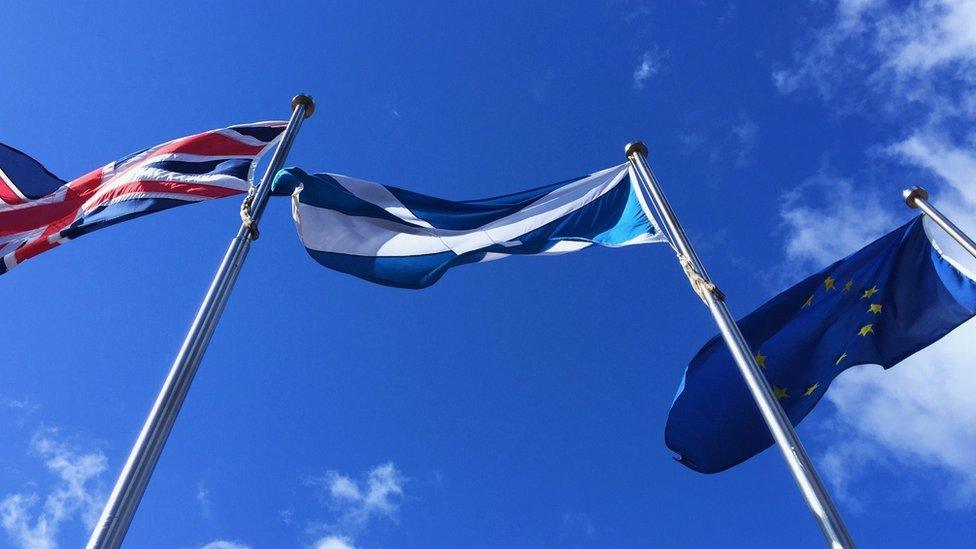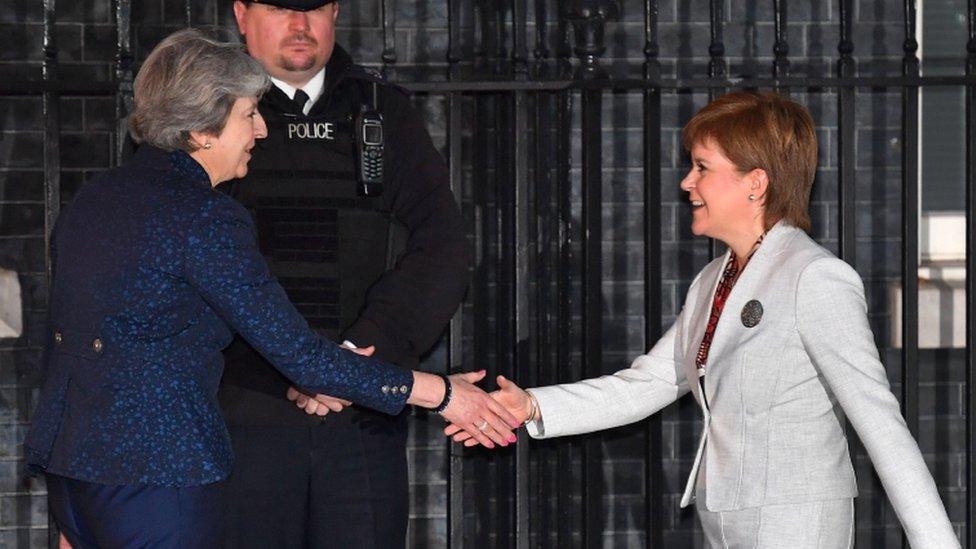Brexit powers talks end without agreement
- Published
- comments

Talks over the transfer of EU powers to Scotland have broken up without a deal - although both sides said progress had been made.
The dispute centres on 111 topics in devolved areas that are currently controlled by the EU.
Ministers from the Scottish and UK governments met in Edinburgh in the latest attempt to break the stalemate.
Talks between Theresa May and Nicola Sturgeon earlier this month also failed to secure a deal.
The latest talks were attended by the UK government's first secretary of state, Damian Green, and Scottish Secretary David Mundell.
They were joined by Scotland's deputy first minister, John Swinney, and Brexit Secretary Mike Russell.
The Scottish government wants the UK government to change its EU Withdrawal Bill to reflect devolution.
Ministers in both Edinburgh and Cardiff have previously branded the legislation a "power grab" as responsibilities for devolved areas would be returned from Brussels to London, so UK-wide frameworks in areas such as agriculture can be drawn up.
'Listening mode'
Speaking after the Edinburgh meeting, Mr Mundell told BBC Scotland that "significant progress" had been made, and that there was broad agreement in many areas - although there was still "a lot of work to do on the details".
He would not say whether the UK government would change the Brexit bill to take account of the concerns of the devolved administrations.
But he insisted that it would be in "listening mode" when amendments to the bill are debated in the Commons next week, and that "we have never said we wouldn't change the bill to make it better."
He added: "I remain confident that we will be able to reach agreement with the Scottish government and that we will get legislative consent from the Scottish Parliament
"We both really want the same thing - we want to ensure that the powers and responsibilities that come back from Brussels rest in the appropriate place, and that we proceed on a presumption of devolution, but we respect that there is a need to have rules and regulations that apply across the whole of the UK."

What is the row over the Brexit bill about?

Theresa May and Nicola Sturgeon held face-to-face talks over the issue earlier this month
The EU Withdrawal Bill states that responsibilities in devolved areas such as agriculture, fishing and the environment that currently reside in Brussels will all return to Westminster rather than Edinburgh or Cardiff immediately after the UK leaves the EU.
The UK government insists this is just a transitional arrangement, and that many of these responsibilities will then be devolved - but has not yet specified which ones.
The Scottish and Welsh governments argue that the powers should automatically go directly to the devolved parliaments under the UK's devolution settlement.
But they agree that frameworks will need to be put in place to ensure co-operation in many areas continues across the UK after Brexit.
They have said they will withhold legislative consent for the bill in their respective parliaments until the dispute over the repatriation of powers from Brussels is resolved.
A series of talks between the two sides - including the recent meeting between Mrs May and Ms Sturgeon - have so far failed to reach an agreement.

Mr Russell said the talks had been held in a "positive and constructive manner."
He added: "Good progress has been made in several areas, most specifically on the issue of UK frameworks.
"This is to be welcomed, however it does not yet go far enough for the Scottish government to recommend parliament agrees to give legislative consent to the EU Withdrawal Bill.
"It must be recognised that fundamentally nothing can be agreed until agreement is reached on both frameworks and amendments to the bill."
Last week, MPs on the Scottish Affairs Committee at Westminster united in calling for the stalemate to be ended, and for the UK government to explicitly set out which powers will be devolved to Scotland, Wales and Northern Ireland after the country leaves the EU.